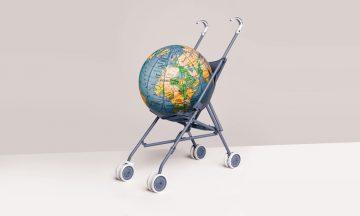Sian Cain in The Guardian:
 When I think that it won’t hurt too much, I imagine the children I will not have. Would they be more like me or my partner? Would they have inherited my thatch of hair, our terrible eyesight? Mostly, a child is so abstract to me, living with high rent, student debt, no property and no room, that the absence barely registers. But sometimes I suddenly want a daughter with the same staggering intensity my father felt when he first cradled my tiny body in his big hands. I want to feel that reassuring weight, a reminder of the persistence of life.
When I think that it won’t hurt too much, I imagine the children I will not have. Would they be more like me or my partner? Would they have inherited my thatch of hair, our terrible eyesight? Mostly, a child is so abstract to me, living with high rent, student debt, no property and no room, that the absence barely registers. But sometimes I suddenly want a daughter with the same staggering intensity my father felt when he first cradled my tiny body in his big hands. I want to feel that reassuring weight, a reminder of the persistence of life.
Then I remember the numbers. If my baby were to be born today, they would be 10 years old when a quarter of the world’s insects could be gone, when 100 million children are expected to be suffering extreme food scarcity. My child would be 23 when 99% of coral reefs are set to experience severe bleaching. They would be 30 – my age now – when 200 million climate refugees will be roaming the world, when half of all species on Earth are predicted to be extinct in the wild. They would be 80 in 2100, when parts of Australia, Africa and the United States could be uninhabitable.
We are in the middle of a mass extinction, the first caused by a single species. There are 7.8 billion of us, on a planet that scientists estimate can support 1.5 billion humans living as the average US citizen does today. And we know that the biggest contribution any individual living in affluent nations can make is to not have children. According to one study, having one fewer child prevents 58.6 tonnes of carbon emissions every year; compare that with living car-free (2.4 tonnes), avoiding a transatlantic return flight (1.6), or eating a plant-based diet (0.82). Another study said it was almost 20 times more important than any other choice an environmentally minded individual could make. Such claims have been questioned. After all, does a parent really bear the burden of their child’s emissions? Won’t our individual emissions fall as technologies and lifestyles change? Isn’t measuring our individual carbon footprint – a concept popularised by oil and gas multinational BP – giving a free pass to the handful of corporate powers responsible for almost all carbon emissions? The only thing that isn’t up for debate is that we all know that we are living in ways that can’t continue.
More here.
